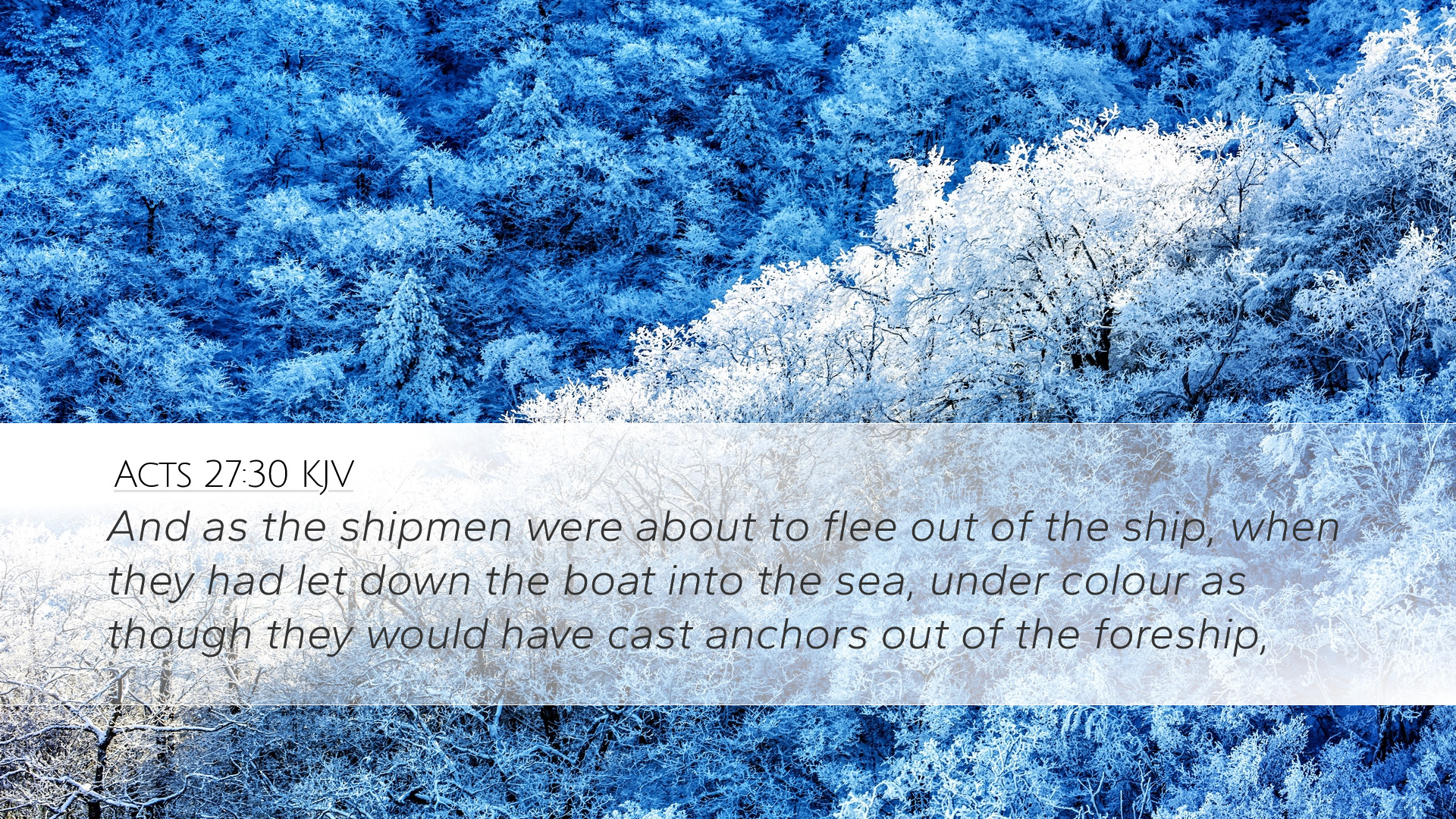Commentary on Acts 27:30
Acts 27:30 states: “And as the shipmen were about to flee out of the ship, when they had let down the boat into the sea, under color as though they would have cast anchors out of the foreship.” This verse captures a pivotal moment during Paul's journey to Rome, emphasizing themes of faith, fear, and divine providence. Below is a distilled commentary combining insights from revered public domain commentaries, including those of Matthew Henry, Albert Barnes, and Adam Clarke.
Contextual Background
Before delving into this verse, it is crucial to understand the narrative context. In Acts 27, Paul, a prisoner, is aboard a ship bound for Rome. The ship encounters a tempestuous storm that threatens to overwhelm it. Paul, having received a divine revelation, reassures the crew of their safety. However, amidst rising fears and uncertainty, we see the crew's instinctive reaction to abandon ship.
Analysis of Key Themes
-
Fear and Desperation
Matthew Henry comments on the psychological state of the sailors, noting that their fear drove them to consider escape. The sailors' decision to flee highlights human frailty when faced with perilous situations. Fear can often cloud judgment, leading individuals to consider misguided alternatives rather than adhering to divine guidance.
-
Human Instinct versus Divine Assurance
Albert Barnes reflects on the contrast between the crew's actions and Paul's steadfast faith. While the sailors prepared to abandon the ship, Paul remained confident in God's promise of safety, which underscores the varying responses to crises. This distinction serves as a call to believers to trust in divine providence rather than succumbing to panic.
-
The Role of Leadership
Adam Clarke provides insights on the leadership displayed through Paul’s faith. Despite being a prisoner, Paul emerges as a voice of reason among the chaos. His ability to lead even in dire circumstances illuminates the importance of strong, faith-driven leadership in guiding others towards safety and hope.
Detailed Exegesis of the Verse
This verse offers a profound commentary on human behavior under duress. The phrase "about to flee" indicates a critical junction—where trust in human capability reaches its peak, often at the expense of faith in God’s promises. The sailors, gripped by fear, sought to abandon their collective responsibility, reflecting a common human tendency to save oneself in times of crisis.
Significance of the Lifeboat
The lifeboat they prepared serves as a metaphor for escape—a deceptive allure that, if acted upon, would lead to dire consequences. Barnes emphasizes that the lifeboat represented a false sense of security; while it appeared to offer salvation, it would ultimately lead to destruction.
Trust in God's Plan
Henry further analyzes this moment, pointing out that the sailors' attempt to escape was both a practical decision in their eyes but also a failure to heed Paul’s dire warnings. This disobedience to God’s revealed truth leads to unrest and insecurity. In contrast, Paul’s reliance on divine assurance serves as a model for believers today—trusting in God’s faithfulness rather than human intervention.
Theological Implications
The implications of Acts 27:30 extend beyond the immediate narrative. This passage invites theological reflection on faith, community, and the sovereignty of God:
-
Community Over Individualism:
The sailors’ desire to save themselves at the risk of endangering others stresses the importance of community responsibility during trials. Clarke argues that true faith involves collective survival—as Paul asserts that everyone must remain on the ship for safety.
-
The Nature of Faith:
This incident raises questions about the nature of faith and trust in God under desperate circumstances. Acts 27:30 prompts readers to reflect on their response to fear—do we lean towards instinctive self-preservation, or do we trust God’s promises?
-
God’s Sovereignty in Crisis:
Paul’s calm amidst the storm illustrates the sovereignty of God. He represents a believer who, despite overwhelming odds, rests in the assurance that God is in control. The contrast between human folly and divine providence becomes starkly evident.
Practical Applications
In concluding this commentary, we see that Acts 27:30 provides profound lessons applicable to modern believers:
- Embrace Faith in Trials: Like Paul, Christians are called to stand firm in faith when circumstances seem tumultuous.
- Lead with Assurance: The need for strong, godly leadership is paramount. Leaders must guide their communities with wisdom and reliance on divine truth.
- Reject Fear-Induced Escape: Believers are to recognize that fear can lead to impulsive decisions which might hinder their spiritual journey.
- Uphold Community Responsibility: In troubled times, it is vital to prioritize collective well-being over selfish tendencies.
Conclusion
Acts 27:30 serves as an important reminder of the duality of human experience in trials: instinctual fear versus faithful assurance. Insights from Matthew Henry, Albert Barnes, and Adam Clarke converge to provide a multi-faceted understanding of how believers are to respond in faith amidst life's storms. As pastors, students, theologians, and Bible scholars reflect on this passage, may they draw strength from the promise that faith in God ultimately prevails over fear.


